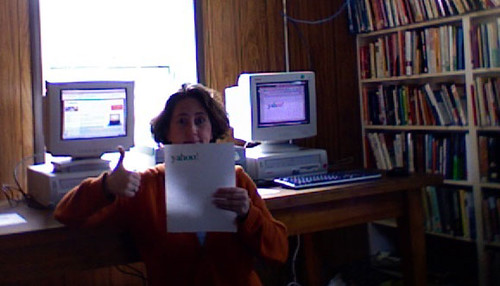I haven’t been digging too deeply into the Gorman back and forth because I’ve said my piece and unless he says something radically different, that’s my story and I’m sticking to it. It’s been fun to read a few more spirited responses than mine, I like what booktruck has to say.
[H]e has an opportunity to fulfill a role as a public intellectual talking about libraries, archives and information topics that are important to the public, and he blows it on a self-referential argument chasing some bygone ideal of what it means to have reasoned discourse (bypassing, like, the last 70 years of western thought!), and in a needlessly puffy and alienating style that would (in a perfect world) never pass muster in a “real†scholarly setting.
Also don’t miss a counter-essay from Matthew “An Unquiet History” Battles. What is particularly interesting about his response is the bizarrely snooty comments it receives especially the first few.
[I]n the end, we’re still left with a Wild West ethos on the Web where kids armed with a powerful new toy (yes, yes, the toys and tools are “creative†too!) can hide behind anonymity, shirk responsibility, pretend to be professors of Church doctrine a la “Essjay†(in the recent Wikipedia scandal), and trash and defame the character of a John Seigenthaler. All with impunity and in the name of progress, creativity (there’s that word again!), and “wildly individual consciousnesses†(Battles is too good a stylist to float such a phrase).
If that’s the high-level discourse so often lamented to be lacking from “blogs” then I can say I don’t much miss it. It’s just blogging with a bigger vocablary, truly. Wouldn’t it be sad if the Britannica Blog just turned into another “you think you’re so great but you’re really not so great” back and forth? “Where Ideas Matter” indeed!
